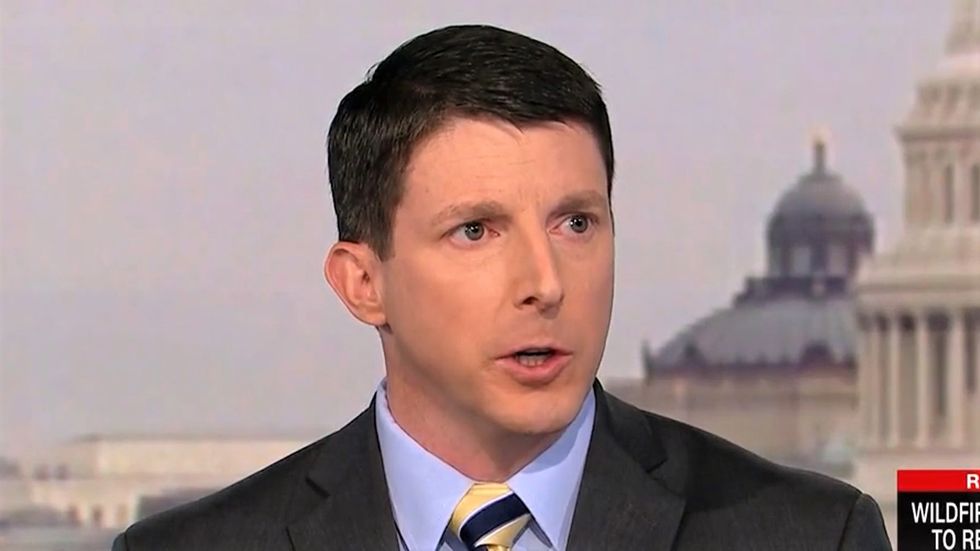
Navy Commander (ret.) Guy Snodgrass has a new book detailing all of the horrific things the military has had to deal with under President Donald Trump's administration. In an interview with Scott Dworkin for his podcast, Snodgrass explained how Trump's tweets enacting random demands threw the Pentagon for a loop.
Snodgrass served as the communications chief for former Defense Secretary James Mattis, a job that ultimately ended his career. In his new memoir, Holding the Line: Inside Trump's Pentagon with Secretary Mattis, Snodgrass details the shocking ways that Trump impacted national security with his erratic behavior and impulsive tweets.
In his lead-in, Dworkin noted that these are the people tasked with keeping America safe, but the president made that more difficult with every random tweet.
Snodgrass explained that his career was on the up and up, he'd already had command of a fighter squadron and was slated to command a carrier airwing. He only changed his pathway in the Navy because Gen. Mattis asked him to join the Pentagon team.
He explained that there were several tweets that caused problems for the Pentagon, from the invention of the Space Force and the sudden change in policy to stop military exercises with the South Koreans. But the one that caused the most problems was the decision early on in Trump's presidency to ban transgender people from serving.
According to Snodgrass, Mattis was going through a lot of research to detail the specifics of the impact of such a policy that they expected would end up in the courts.
"And of course that was undone just within minutes of the tweet coming out," Snodgrass explained. "As I write in the book, there's an entire chapter about how Mattis was caught unaware. He was caught unaware as he was in Washington state with the chairman of the joint chiefs of staff, Gen. Joe Dunford. Nobody had an awareness from the White House that this was happening. In fact, they talked just recently on the status of the transgender review process, and so it caught everyone off guard."
No one knew if this was an effort by Trump to play to his base or an act of actually making policy via tweet. At the time, Dunford released a statement saying nothing would change until Mattis came back and was able to speak with the experts.
Another key component of his book details media reports that were denied by the White House or the Pentagon but were actually true. In the case of the announcement to stop military exercises with South Korea, the Pentagon claimed they knew it was coming, but the truth is that no one had any idea.
He explained that it's just one of the many examples of Pentagon officials "being caught off guard."
"What you see sometimes is that the administration will change direction on a whim," he told Dworkin. "One of the things you just referred to was the relatively no-notice withdraw from Syria."
He said he saw something online that showed when Trump was publicly thanking the Kurdish allies for their help in defeating ISIS and saying that we'd never abandon them. Of course, one year later, that all changed.
"That sets a very jarring juxtaposition to show just the change in one year kind of as those political whims change," Snodgrass continued. He went on to say that one thing that can harm international relationships is instability. Even if politicians need to say something to a domestic audience, they can call the foreign leaders and flag it as something forthcoming, but reassure the leaders that everything is fine and they're still allies.
Snodgrass said that his book, which came out in late October, was his attempt to detail what he witnessed in an apolitical way the facts of what the Pentagon has been dealing with.




